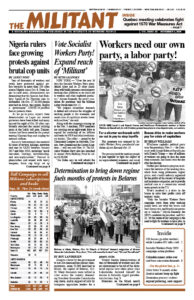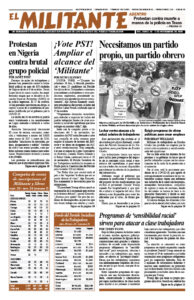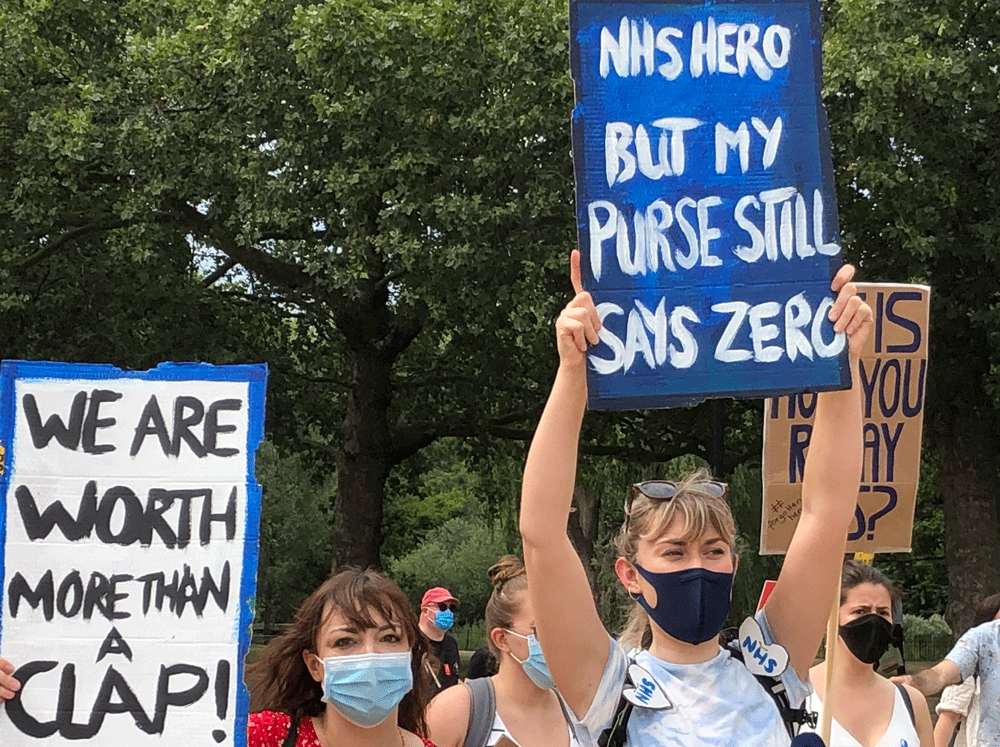LONDON — With the U.K.’s “transition” out of the European Union’s trading arrangements ending Dec. 31, talks between London and EU leaders in Brussels over a post-Brexit trade deal have hit the rocks.
Prime Minister Boris Johnson blames Brussels. The U.K. will leave the EU’s trade rules with “high hearts and complete confidence,” he said Oct. 16. But his optimism masks the reality facing both Britain’s capitalist rulers, as well as working people, for different reasons.
The rulers seek to carve out new trade arrangements worldwide that best reflect the interests of the declining imperialist power. Working people face the government’s refusal to offer any protection from a deepening economic crisis, marked by job cuts, declining real wages, and the government’s inability to stem the coronavirus pandemic as it worsens health care provisions.
Some 700,000 jobs were axed between March and September. The government forecasts unemployment rising to 3.5 million by next year.
Real wages continue to be eroded. The government’s furlough scheme at 80% of wages ends Oct. 31, to be replaced at 66% for workers mostly in bars and restaurants forced to close.
Income has also been slashed for the 3 million “self-employed” workers who get no government assistance, and for the rising number of workers on “zero hours” temporary contracts who have had their hours cut.
Government measures in reaction to the pandemic have worked to the detriment of working people, with a nursing homes crisis in which thousands of elderly residents have been left to die in poorly equipped, understaffed, overcrowded facilities.
Under the banner of “protecting the National Health Service,” and stopping the spread of the virus, the government has inflicted cuts to cancer screening and delays to treatment, leading to thousands of deaths. Operations that officials call “nonurgent,” such as hip, knee and shoulder replacements, have been put on hold. As a result 2 million are on a waiting list of over 18 weeks, triple the figure from August of last year. At the same time, the U.K. has had over 40,000 COVID-19 deaths, the highest in Europe.
Johnson’s government, acting for the majority of the capitalist ruling families, hopes to realign the rulers’ trade and foreign policy away from the EU and toward Washington. In line with Washington’s stance, the U.K. government has moved against Chinese-owned tech giant Huawei and is planning to limit Chinese companies’ investments in the U.K. nuclear power industry.
It has struck a trade deal with Tokyo and has introduced legislation to end protectionist food standards to facilitate agreements with the governments of Australia and New Zealand.
Some within the U.K. ruling class are pressing the government for concessions to Brussels to salvage a trade deal with the EU, claiming that Europe remains the British bosses’ main market. Millions of workers were part of the majority that voted for the U.K. to quit the EU in 2016, fed up with EU regulations that interfere with their lives, as well as with claims by Conservative, Labour and the other bosses’ parties that doing so would be a disaster.
The EU — a protectionist trading bloc that competes against the U.S. rulers — has been weakened as rival member states protect their own conflicting interests in the face of a spreading worldwide capitalist crisis. It has functioned to benefit the German rulers, and to a lesser degree those in France, at the expense of the bloc’s weaker rulers. Brexit dealt them and the EU itself an additional blow.
U.K. gov’t rift with EU deepens
EU chiefs are demanding access to U.K. coastal waters for French and other fishing companies, as well as demanding that they get to regulate U.K. government subsidies to companies here.
Johnson needs these subsidies to finance his election pledge to “level up” the U.K.’s most deprived regions. This is key to shoring up his Conservative Party’s electoral support among former Labour Party voters. The government’s use of subsidies to company bosses has escalated during the pandemic. The rulers in Berlin and Paris complain that these handouts give U.K. companies a competitive advantage against their rivals. Such protectionist measures are in fact used by all capitalist governments.
EU negotiator Michel Barnier threatened to ban British food exports to Northern Ireland, a move Johnson called an attempt to break up the U.K., which is under growing strain.
Johnson countered Barnier’s threats with a “U.K. Internal Market Bill.” It overturns the withdrawal agreement between the U.K. government and the EU, which guaranteed an open border between Northern Ireland and the Irish Republic. Johnson seeks to hold Northern Ireland in the U.K. in the face of growing economic ties between it and the Republic of Ireland, which remains in the EU. The division of Ireland was imposed by the British rulers nearly a century ago after an independence war liberated the majority of the country from British colonial domination.
The Scottish National Party, a capitalist party that heads the devolved Scottish government, is leading growing calls for a referendum on Scottish independence.
British bosses have experienced a sharper economic slump over the last six months than their rivals and are pushing this crisis onto working people. The government — despite its big parliamentary majority — is being denounced by both Johnson’s opponents and long-term supporters. “I know that people are furious with me and are furious with the government,” Johnson said on BBC TV Oct. 4.
Working people, facing rising joblessness, cuts to wages, and deteriorating living and working conditions are looking for ways to defend themselves. It’s clearer to many today that the main enemy is London, not Brussels.


